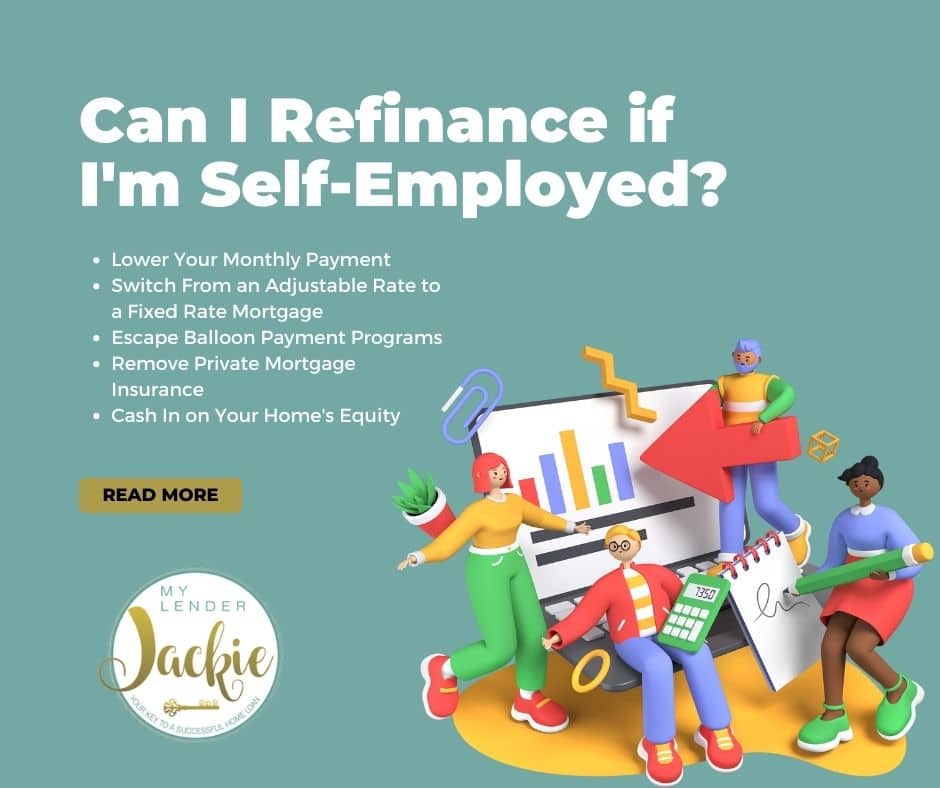Refinancing as a self-employed person might seem out of reach. Without typical proof of income or tax returns to prove to your lender that you can afford your home, qualifying for a traditional mortgage refinance is tricky. But that doesn’t mean you can’t refinance as a self-employed person. We have some creative solutions for you to make your goals possible.
Contact us any time to learn more, or keep reading for more information about refinancing for self-employed people.
Can I Refinance if I’m Self-Employed?
Why You Might Want to Refinance
Even with higher rates than this time last year, refinancing can still be the right solution for many people. There are a few situations you may find yourself in that make you an ideal candidate for refinancing, including:
- You didn’t refinance during the past couple of years when rates were at historic lows, so your current rate is above 7%. If this is the case, you can likely save money on your monthly payment, as well as pay less interest over the life of the loan.
- You need to remove a spouse from the mortgage as a part of a divorce, putting the house solely under your name.
- You have a significant amount of equity in your home that you’d like to access. By doing a cash-out refinance, you can often raise your monthly mortgage payment by far less than it would cost to borrow the same amount with a different form of debt.
What is a Bank Statement Loan?
One of the best options for self-employed people looking to refinance is a bank statement loan. In this type of mortgage, the borrower does not have to provide a W-2 or tax returns, and approval is instead determined based on their bank statements. If you can show a history of consistent cash flow and deposits that are equivalent to the income required on a traditional mortgage, chances are you can qualify for this solution. Qualification for bank statement loans can be based on as little as 12 months of statement history.
How Much Can I Cash Out with a Bank Statement Refinance?
Depending on your eligibility and cash reserves, you can borrow up to 80%-90% of the home’s value with a bank statement loan. If you are refinancing to pull cash out of your equity, it might look like this:
If you currently owe $600,000 on your home, but it is worth $800,000, you could refinance with a bank statement loan for 80% of the home’s value, or $720,000. This means there is $120,000 of equity available to you in a cash-out refinance situation.
Additional – What to know about 2-1 Buydowns for Self-Employed Borrowers
How Long Does it Take to Close on a Bank Statement Loan?
Bank statement loans are often a more time-efficient solution when compared to traditional mortgages. It is typical for close on a bank statement loan is as little as 3 weeks, with no need to check in with employers and a no-nonsense approach that allows our underwriters to work efficiently.
If you want to learn more about whether a bank statement loan may be the perfect solution for you in your refinancing plans, we can help. We would love to answer your questions, so contact us any time.
More Advice on Self-Employment Loans
- FAQs on Calculating Self-Employment Income for Mortgages
- 10 Types of Borrowers Categorized as Self-Employed
- How to Get a Home Loan Without Tax Returns
- New Mortgage Requirements for Self-Employed Borrowers
- Obtain a Mortgage When You are Newly Self-Employed
- FAQ for Self-Employed Home Loans
- Can I Refinance if I’m Self-Employed?


